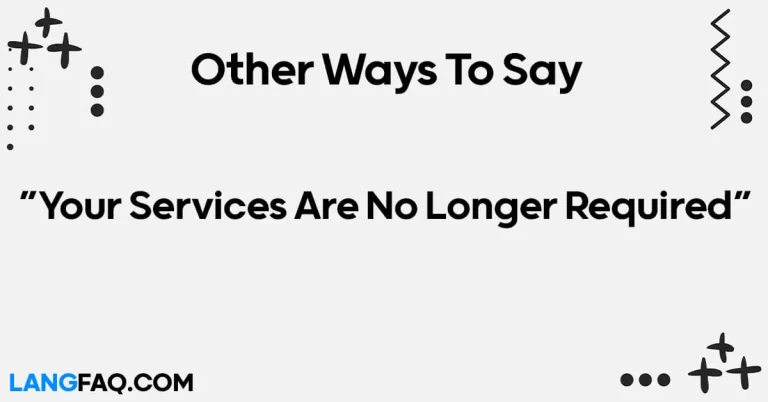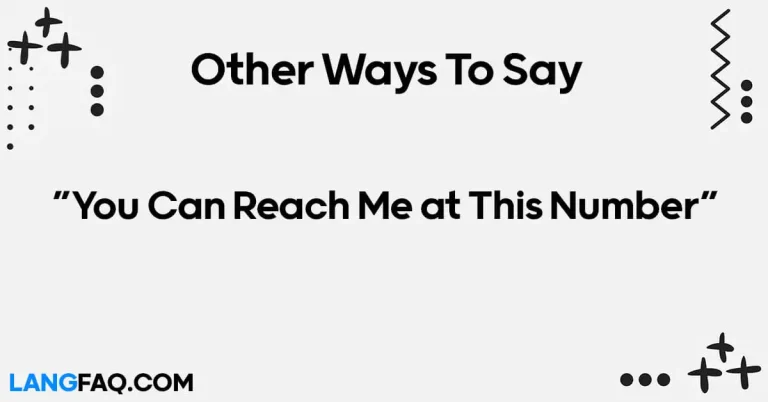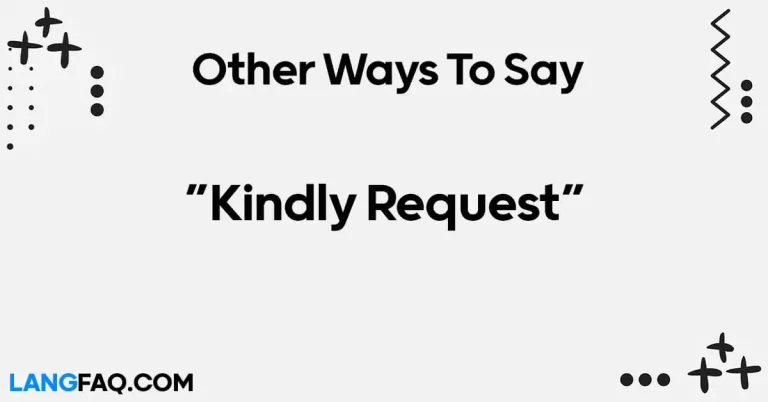In our journey through relationships and interactions, expressing empathy becomes crucial. “I’m Sorry You Feel That Way” may seem like a default phrase, but there are myriad alternative ways to convey understanding and compassion. Let’s delve into 12 unique expressions, each carrying its own nuance and emotion.
12 Other Ways to Say “I’m Sorry You Feel That Way”
Here are 12 alternative ways to express “I’m Sorry You Feel That Way”:
- I understand your perspective.
- I can see where you’re coming from.
- It must be challenging for you.
- I empathize with your feelings.
- I acknowledge your emotions.
- Your feelings are valid.
- I hear what you’re saying.
- I’m sorry to hear you’re feeling that way.
- It sounds like you’re going through a tough time.
- I’m here for you if you want to talk.
- I wish things were different for you.
- It must be hard dealing with those emotions.
Here’s a table providing meanings and examples for the 12 alternative ways to say “I’m Sorry You Feel That Way”:
| Expression | Meaning | Example |
|---|---|---|
| I understand your perspective. | Acknowledging comprehension of their viewpoint. | “I understand your perspective on this matter.” |
| I can see where you’re coming from. | Recognizing the basis of their feelings. | “I can see where you’re coming from, and it makes sense.” |
| It must be challenging for you. | Expressing empathy for their difficult situation. | “It must be challenging for you to juggle work and family.” |
| I empathize with your feelings. | Conveying a shared emotional connection. | “I empathize with your feelings about the loss of a pet.” |
| I acknowledge your emotions. | Recognizing and validating their emotional state. | “I acknowledge your emotions and am here to support you.” |
| Your feelings are valid. | Affirming the legitimacy of their emotions. | “Your feelings are valid, and it’s okay to feel this way.” |
| I hear what you’re saying. | Confirming active listening and understanding. | “I hear what you’re saying, and I appreciate your honesty.” |
| I’m sorry to hear you’re feeling that way. | Offering condolences and support. | “I’m sorry to hear you’re feeling that way; I’m here for you.” |
| It sounds like you’re going through a tough time. | Acknowledging their challenging circumstances. | “It sounds like you’re going through a tough time at work.” |
| I’m here for you if you want to talk. | Extending a listening and supportive presence. | “I’m here for you if you want to talk about anything.” |
| I wish things were different for you. | Expressing a desire for positive change. | “I wish things were different for you in this situation.” |
| It must be hard dealing with those emotions. | Recognizing the difficulty of their emotions. | “It must be hard dealing with those emotions; I’m here for you.” |
In various situations, expressing empathy and understanding is crucial for building connections. These alternative phrases provide a nuanced way to convey support and compassion, allowing for a more thoughtful and considerate interaction. Using these expressions demonstrates a willingness to engage empathetically, fostering stronger relationships and communication.
Is It Correct to Say “I’m Sorry You Feel That Way”?
The phrase “I’m sorry you feel that way” is a common expression used to acknowledge someone’s emotions or reactions without necessarily admitting fault. However, its appropriateness depends on the context and the relationship between the individuals involved. Let’s explore the nuances of this phrase:
Understanding the Context:
The appropriateness of this phrase hinges on the situation. It’s commonly used when someone expresses dissatisfaction, disappointment, or any negative emotion. While it may not convey a direct apology, it recognizes the other person’s feelings.
In Formal Settings:
In formal or professional contexts, it’s crucial to choose language carefully. “I’m sorry you feel that way” can be perceived as dismissive or lacking genuine empathy. In such settings, a more detailed and considerate response might be more appropriate.
In Personal Relationships:
In personal relationships, the effectiveness of this phrase varies. If used genuinely and accompanied by further communication about the issue, it can be a starting point for understanding and resolution. However, if overused or perceived as insincere, it may strain relationships.
Pros:
- Acknowledges Emotions: It recognizes the other person’s feelings, showing that you are aware of their emotional state.
- Non-Apology Apology: It offers a form of apology without explicitly admitting fault, which can be suitable in certain situations.
Cons:
- Perceived Insincerity: Without additional context or follow-up, it may come across as insincere or dismissive.
- Lack of Accountability: In situations where an apology is warranted, this phrase might fall short of taking full responsibility for one’s actions.
Usage Tips:
- Follow Up: If you use this phrase, consider following up with a more detailed conversation to address the underlying issues.
- Choose Wisely: Be mindful of the relationship and context. In some cases, a more direct apology or a different expression of empathy might be more suitable.
Alternatives:
- I Hear What You’re Saying: Confirms active listening and understanding.
- I Understand Your Perspective: Shows recognition of their viewpoint.
- Let’s Discuss This Further: Indicates a willingness to engage in open dialogue.
Professional Mail Example With “I’m Sorry You Feel That Way”
Subject: Acknowledging Your Concerns and Offering Support
Dear [Recipient’s Name],
I hope this email finds you well. I wanted to reach out regarding our recent meeting and the concerns you shared. Your feedback is invaluable, and I appreciate your openness in expressing your feelings.
I’m sorry you feel that way about the current project direction. Your insights are crucial to our collective success, and I want to ensure we address any issues promptly. Let’s schedule a follow-up meeting to discuss your specific concerns and explore potential solutions together.
Your dedication to the team’s success is evident, and I want to assure you that your perspective is highly valued. We are committed to fostering an environment where every team member feels heard and supported.
Please let me know your availability for a meeting this week, and we can delve into the details. I am here to listen, understand, and work collaboratively to find the best way forward.
Thank you for your continued dedication to our shared goals, and I look forward to our conversation.
Best regards,
[Your Full Name] [Your Position] [Your Company] [Your Contact Information]
I Understand Your Perspective
Definition: Acknowledging comprehension of their viewpoint.
Usage: In professional contexts, acknowledging differing opinions is crucial. Saying “I understand your perspective” can defuse tension and foster collaboration. In personal relationships, it shows emotional intelligence.
Example Sentence: Colleague: “I believe our approach should be more data-driven.”
You: “I understand your perspective, and I value your analytical mindset.”
Email Sample:
*Subject: Acknowledging Your Viewpoint
Hi [Colleague’s Name],
I appreciate your insights during our meeting. I understand your perspective on incorporating more data into our approach. Let’s discuss further to find a balanced solution.
Best regards,
[Your Name]*
Variations:
- I grasp where you’re coming from.
- I see the situation from your viewpoint.
I Can See Where You’re Coming From
Definition: Recognizing the basis of their feelings.
Usage: In mentor-mentee relationships, saying “I can see where you’re coming from” fosters trust. It implies a shared understanding, promoting a positive learning environment. In personal friendships, it shows genuine interest in their experiences.
Example Sentence: Mentee: “I find it challenging to balance work and personal life.”
Mentor: “I can see where you’re coming from; it’s a common struggle, and we can work on strategies together.”
Email Sample:
*Subject: Understanding Your Challenges
Hi [Mentee’s Name],
I’ve been reflecting on our recent discussions. I can see where you’re coming from regarding work-life balance. Let’s set up a meeting to explore some strategies.
Best regards,
[Your Name]*
Variations:
- I understand your standpoint.
- I recognize the basis of your feelings.
It Must Be Challenging for You
Definition: Expressing empathy for their difficult situation.
Usage: In moments of crisis, showing empathy is crucial. Saying “It must be challenging for you” conveys understanding without downplaying their struggles. In a professional setting, it’s a respectful acknowledgment of workload or tight deadlines.
Example Sentence: Friend: “I’ve been dealing with health issues lately.”
You: “It must be challenging for you; I’m here to support you through it.”
Email Sample:
*Subject: Supporting You Through Challenges
Hi [Friend’s Name],
I heard about your health challenges, and I want you to know that it must be incredibly challenging for you. If there’s anything I can do to support, please let me know.
Take care,
[Your Name]*
Variations:
- I can imagine this is tough for you.
- It must be difficult dealing with this.
I Empathize With Your Feelings
Definition: Conveying a shared emotional connection.
Usage: In personal relationships, saying “I empathize with your feelings” strengthens the emotional bond. It’s suitable for situations requiring deep understanding, such as during times of grief or joy. In professional settings, it adds a human touch to formal interactions.
Example Sentence: Family Member: “I feel overwhelmed by everything lately.”
You: “I empathize with your feelings; let’s work on finding solutions together.”
Email Sample:
*Subject: Offering Empathy and Support
Hi [Family Member’s Name],
I heard about what you’ve been going through, and I want you to know that I empathize with your feelings. Let’s schedule a time to talk and support each other.
Warm regards,
[Your Name]*
Variations:
- I share your emotions.
- I understand and resonate with your feelings.
I Acknowledge Your Emotions
Definition: Recognizing and validating their emotional state.
Usage: In situations where someone is expressing vulnerability, saying “I acknowledge your emotions” communicates respect. In professional settings, it’s an essential response during difficult conversations, fostering a culture of emotional intelligence.
Example Sentence: Colleague: “I’m frustrated with the lack of communication in the team.”
You: “I acknowledge your emotions, and I agree that improving communication is crucial.”
Email Sample:
*Subject: Addressing Team Concerns
Hi [Colleague’s Name],
Your recent observations about team communication are valid, and I acknowledge your emotions. Let’s discuss strategies to enhance our collaboration.
Best,
[Your Name]*
Variations:
- I recognize your emotional state.
- I validate your feelings on this matter.
Your Feelings Are Valid
Definition: Affirming the legitimacy of their emotions.
Usage: In situations where someone may doubt their feelings, saying “Your feelings are valid” provides reassurance. It’s effective in personal relationships, especially during disagreements. In a mentoring scenario, it encourages open communication.
Example Sentence: Friend: “I feel guilty for taking time off.”
You: “Your feelings are valid; self-care is essential, and you shouldn’t feel guilty about it.”
Email Sample:
*Subject: Validating Your Concerns
Hi [Friend’s Name],
I wanted to let you know that your feelings about taking time off are entirely valid. Let’s catch up soon to discuss how you’re doing.
Take care,
[Your Name]*
Variations:
- I acknowledge the legitimacy of your feelings.
- It’s okay to feel the way you do.
I Hear What You’re Saying
Definition: Confirming active listening and understanding.
Usage: In both professional and personal contexts, saying “I hear what you’re saying” reinforces active listening. It’s valuable during negotiations, team discussions, and personal conversations where understanding is key.
Example Sentence: Spouse: “I’ve been feeling neglected lately.”
You: “I hear what you’re saying, and I’m committed to finding ways to make you feel valued.”
Email Sample:
*Subject: Acknowledging Your Concerns
Hi [Spouse’s Name],
I’ve been reflecting on our recent conversations, and I want you to know that I hear what you’re saying about feeling neglected. Let’s work together to strengthen our connection.
Warm regards,
[Your Name]*
Variations:
- I understand your message.
- I’m attentive to your words.
I’m Sorry to Hear You’re Feeling That Way
Definition: Offering condolences and support.
Usage: In various scenarios, expressing sympathy is crucial. Saying “I’m sorry to hear you’re feeling that way” is a formal and caring response. It’s appropriate in both professional and personal contexts.
Example Sentence: Colleague: “I’ve been stressed about meeting deadlines.”
You: “I’m sorry to hear you’re feeling that way; let’s explore ways to alleviate some of the pressure.”
Email Sample:
*Subject: Supporting You Through Stress
Hi [Colleague’s Name],
I heard about the stress you’ve been experiencing, and I’m sorry to hear you’re feeling that way. Let’s schedule a time to discuss how we can manage the workload.
Best regards,
[Your Name]*
Variations:
- I’m sorry you’re going through this.
- It saddens me to hear you’re feeling that way.
It Sounds Like You’re Going Through a Tough Time
Definition: Acknowledging their challenging circumstances.
Usage: In situations where someone may be facing difficulties, saying “It sounds like you’re going through a tough time” expresses empathy. It’s suitable for both formal and informal relationships, showing compassion without prying.
Example Sentence: Friend: “I’ve been dealing with personal issues lately.”
You: “It sounds like you’re going through a tough time; I’m here to offer support whenever you need it.”
Email Sample:
*Subject: Supporting You Through Challenges
Hi [Friend’s Name],
I heard about the challenges you’ve been facing, and it sounds like you’re going through a tough time. If you want to talk or need support, I’m here for you.
Warm regards,
[Your Name]*
Variations:
- I sense you’re facing challenges.
- It seems like you’re going through a difficult period.
I’m Here for You if You Want to Talk
Definition: Extending a listening and supportive presence.
Usage: In personal relationships, saying “I’m here for you if you want to talk” reinforces emotional support. In a professional context, it’s suitable for colleagues experiencing work-related stress or challenges.
Example Sentence: Family Member: “I’m struggling with the recent loss of a loved one.”
You: “I’m here for you if you want to talk; sometimes sharing can help ease the pain.”
Email Sample:
*Subject: Offering Support
Hi [Family Member’s Name],
I heard about your loss, and I want you to know that I’m here for you if you want to talk. Take your time, and we can discuss whenever you’re ready.
Take care,
[Your Name]*
Variations:
- Feel free to reach out if you need to talk.
- I’m available whenever you want to discuss things.
I Wish Things Were Different for You
Definition: Expressing a desire for positive change.
Usage: In situations where someone is facing challenges, saying “I wish things were different for you” shows genuine concern. It’s a versatile expression suitable for various relationships and contexts.
Example Sentence: Friend: “I’ve been struggling to find a new job.”
You: “I wish things were different for you; let’s explore ways to enhance your job search.”
Email Sample:
*Subject: Exploring New Opportunities
Hi [Friend’s Name],
I’ve heard about the challenges you’re facing in your job search, and I wish things were different for you. Let’s catch up and brainstorm some new opportunities.
Best,
[Your Name]*
Variations:
- I hope things take a positive turn for you.
- Wishing for better circumstances for you.
It Must Be Hard Dealing With Those Emotions
Definition: Recognizing the difficulty of their emotions.
Usage: In situations where emotions are intense, saying “It must be hard dealing with those emotions” conveys understanding. It’s suitable for close relationships where a deeper level of empathy is appreciated.
Example Sentence: Spouse: “I’ve been feeling overwhelmed with anxiety.”
You: “It must be hard dealing with those emotions; let’s explore ways to manage anxiety together.”
Email Sample:
*Subject: Supporting You Through Emotional Struggles
Hi [Spouse’s Name],
I understand that you’ve been dealing with overwhelming emotions, and it must be hard for you. Let’s work on strategies to navigate through this together.
Warm regards,
[Your Name]*
Variations:
- Dealing with such intense emotions must be challenging.
- I can imagine it’s tough managing those emotions.
FAQs:
Q: Can expressions of empathy be conveyed without using words? A: Absolutely. Non-verbal cues, such as body language and silence, can be powerful forms of expressing empathy.
Q: How can empathy be effectively applied in professional settings? A: Tailor your expressions to the context, acknowledging emotions while maintaining professionalism.
Q: Are there universal empathetic phrases suitable for any situation? A: While some phrases are versatile, adapting to specific emotions and scenarios enhances their effectiveness.
Q: Is it possible to over-apologize or overuse empathetic expressions? A: Yes, excessive apologies may diminish their impact. Use them sincerely and judiciously.
Q: Can empathetic communication contribute to conflict resolution? A: Absolutely. Understanding and acknowledging emotions are key elements in resolving conflicts.
Q: What role does emotional intelligence play in effective communication? A: Emotional intelligence enhances the ability to navigate and respond empathetically to diverse emotions.
Conclusion:
In the intricate tapestry of human interactions, expressing empathy is an art. The alternatives to “I’m Sorry You Feel That Way” presented here aim to enrich that art, offering a diverse palette of expressions. Empathy is the bridge that connects us, fostering deeper connections and understanding. Use these alternatives thoughtfully, and watch as your relationships flourish.







